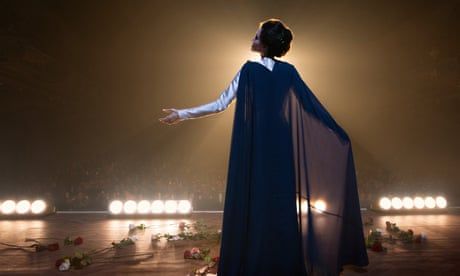
Pablo Larraín’s strange and mordant drama portrays Callas’s haughty struggle as her voice begins to fail but her stardom remains undimmed
Angelina Jolie declaims an imperious performance as opera star Maria Callas in this strange, sad, mordantly witty film from screenwriter Steven Knight and director Pablo Larraín, showing her declining months in Paris in 1977; the lioness in winter succumbing with ecstatic defiance to illness and loneliness. Maria broods over her “medication” and neglects to eat, and she is impossibly difficult with the servants, housekeeper Bruna (Alba Rohrwacher) and valet Ferruccio (Pierfrancesco Favino), who are the aghast witnesses to her decline – and she is beginning to relinquish the idea that she will ever sing again. The whole thing is interspersed with pharma-fuelled hallucination-flashbacks to the days of her celebrity pomp, but also further back to her traumatised girlhood in Nazi-occupied Greece.
This film has had a mixed, sometimes frosty reception; I can only say I found Jolie’s performance as luxurious as state-of-the-art fake fur, and there is an overt theatricality and artificiality which gives the film its life. Jolie’s own singing is digitally fused with lip-synced overdubs of Callas’s own recordings, while her non-singing performance is gorgeously haughty and self-aware, her eyes pathetically magnified to frog-like dimensions by the big glasses she wears for stalking about Paris, both demanding and resenting fan recognition. Her lips are always pursed in a very amusing moue of discontent, always about to deliver a curt putdown. And that voice – a theatrical refinement of the way Callas spoke in English, removing the American trace, but substituting an Anglicised nasal twang like a very subtle Katharine Hepburn with a hint of … yes … Gloria Swanson.
Continue reading...